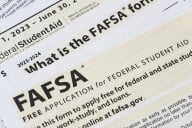You have /5 articles left.
Sign up for a free account or log in.

Roman Didkivskyi from Getty Images
This myth of affirmative action being harmful to Asian Americans is creating a deliberate racial wedge between communities of color.”
The recent Supreme Court decision on affirmative action in admissions has cast a spotlight on a growing fissure in American racial politics—the relationship between Asian Americans and Black Americans. Since the lawsuits against Harvard University and the University of North Carolina were first filed, they have generated a national dialogue on Asian Americans and how they are viewed within the context of racial discrimination.
Research on the position of Asian Americans in American society has often noted their precarious position—specifically that they are often stereotyped as the “model minority.” What does this idea mean? It means that white Americans will describe Asian Americans as the “proper” example of how racial minorities ought to “behave.” In effect, Asian Americans are often articulated as being a “non-threatening” racial minority group.
But there is another element of this story that is often missed. To whom is this model minority trope being compared? Nonthreatening in relation to whom? The answer is to Black Americans. The central thrust behind the framing of this idea is that two stereotypes are at work: Asian Americans are touted by white Americans as hard working, and are used as a model to denigrate Black Americans. The idea behind this is simple: if Black Americans just worked as hard as the stereotyped Asian American, the wealth disparities that Black Americans experience would disappear.
This racial discourse pits two marginalized groups against one another. By virtue of being the “model,” Asian Americans are often described more warmly by white Americans, in ways that suggest that Asians are not seen as threatening. However, in a recently published study, I empirically show that this idea is categorically false.
Through a series of experiments, I shared Census data about the projected population increase of Asian Americans in the U.S. with a subset of Americans, and followed that data with a series of questions on their perceptions of Asian Americans and certain U.S. policies. My research found that white Americans experienced a strong sense of racial threat that is distinctly from Asian Americans when they are presented with simple Census information about how Asians are the fastest-growing racial group in the U.S. Moreover, these same threatened Americans become more supportive of policies that directly discriminate against Asian Americans. For example, white Americans exposed to the Census data became more supportive of a racial quota system in university admissions—which was previously struck down in Regents of the University of California v. Bakke (1978)—and more supportive of forcibly testing Asian American and Asian immigrants for COVID-19 at the height of the pandemic.
Conducted over the span of two years, my research also showed that presenting white Americans with this Census information decreased their perception that Asian Americans experienced discrimination in university admissions—the very claim that led to the lawsuits that led the Supreme Court to strike down affirmative action.
The dynamics of these findings are complex, but the overarching point is simple: Asian Americans are viewed by white Americans as the model minority, until they are not. Furthermore, my findings lend support to the idea that Asian Americans were used by certain Americans who disapproved of affirmative action as a political pawn for targeting this policy. Asian Americans are in a precarious racial position in social and political dynamics. As a group, they are often treated as political fodder.
This recent research, in tandem with this national conversation about racial dynamics, should give all Americans pause. It is absolutely crucial that we give further attention to Asian Americans’ experience in our racial discourse, and that we contextualize how we think about this experience in the overarching system of race in the U.S. When we think about questions of diversity in the workplace, in schools and colleges, and in society at large, we are in a position to move beyond treating experiences of race and racial groups in isolated ways.
As Americans of color have long understood, our racial identities are relational at their core. When we speak of one racial group, we often call to other groups implicitly in points of comparison in positive and negative ways. We collectively need to start saying the quiet part louder.








